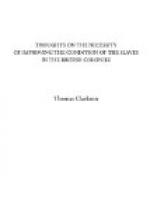That all have been unjustly deprived of their rights, may be easily shown by examining the different grounds on which they are alleged to be held in bondage. With respect to those in our colonies, who are Africans, I never heard of any title to them but by the right of purchase. But it will be asked, where did the purchasers get them? It will be answered, that they got them from the sellers; and where did the sellers, that is, the original sellers, get them? They got them by fraud or violence. So says the evidence before the House of Commons; and so, in fact, said both Houses of Parliament, when they abolished the trade: and this is the plea set up for retaining them in a cruel bondage!!!
With respect to the rest of the slaves, that is, the Creoles, or those born in the colonies, the services, the perpetual services, of these are claimed on the plea of the law of birth. They were born slaves, and this circumstance is said to give to their masters a sufficient right to their persons. But this doctrine sprung from the old Roman law, which taught that all slaves were to be considered as cattle. “Partus sequitur ventrem,” says this law, or the “condition or lot of the mother determines the condition or lot of the offspring.” It is the same law, which we ourselves now apply to cattle while they are in our possession. Thus the calf belongs to the man who owns the cow, and the foal to the man who owns the mare, and not to the owner of the bull or horse, which were the male parents of each. It is then upon this, the old Roman law, and not upon any English law, that the planters found their right to the services of such as are born in slavery. In conformity with this law they denied, for one hundred and fifty years, both the moral and intellectual nature of their slaves. They considered them themselves, and they wished them to be considered by others, in these respects, as upon a level only with the beasts of the field. Happily, however, their efforts have been in vain. The evidence examined before the House of Commons in the years 1789, 1790, and 1791, has confirmed the falsehood of their doctrines. It has proved that the social affections and the intellectual powers both of Africans and Creoles are the same as those of other human beings. What then becomes of the Roman law? For as it takes no other view of slaves than as cattle, how is it applicable to those, whom we have so abundantly proved to be men?
This is the grand plea, upon which our West Indian planters have founded their right to the perpetual services of their Creole slaves. They consider them as the young or offspring of cattle. But as the slaves in question have been proved, and are now acknowledged, to be the offspring of men and women, of social, intellectual, and accountable beings, their right must fall to the ground. Nor do I know upon what other principle or right they can support




